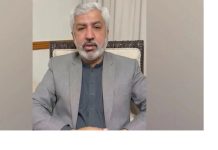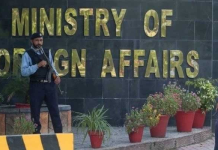China’s involvement in Iran Saudi Arab dialogue, demonstrates the country’s growing diplomatic clout on the world stage.
Iran Saudi agreement also serves as a reminder that diplomacy and dialogue are key to resolving conflicts and maintaining peace.
Syed Ali Nawaz Gillani
“The rivalry between Iran and Saudi Arabia is a major flashpoint in the Middle East, and any efforts to ease tensions between the two countries should be welcomed. China’s role in mediating between Iran and Saudi Arabia highlights its growing influence in the region and its ability to play a constructive role in promoting stability.” – Dr. Naser Al-Tamimi, Middle East analyst and author.
The announcement of the resumption of bilateral relations between Iran and Saudi Arabia, brokered by China, is a significant development in the ongoing political landscape of the Middle East. The tensions between the two regional powers have been a source of instability and conflict in the region, with proxy wars and political maneuvering being played out. However, the success of China’s diplomatic efforts in facilitating the rapprochement signifies a potential shift in the region’s power dynamics.
China’s growing influence in the Middle East is a topic of interest, particularly regarding its role in shaping the region’s future. While China has been successful thus far in its pragmatic and non-interventionist approach, many question how it will balance its relationships with competing powers in the complex political landscape of the region. Nonetheless, it is clear that China’s strategic and economic interests in the Middle East will continue to impact its role in the world. Whether it can effectively navigate this challenging environment remains to be seen.
The timing of the Iran Saudi Arabia Agreement, which was signed on the same day (March 10th) as Chinese President Xi Jinping’s formal re-election to his third term, cannot be ignored. It serves as a clear indication of China’s growing influence and willingness to play a more active role in global affairs, including those in the Middle East.
The deal is also a clue of the waning influence of the United States in the region. For decades, Washington has played a dominant role in shaping the politics and security of the Middle East. However, the recent deal brokered by China signals a shift in the balance of power in the region, as other nations begin to assert their influence.
The resumption of diplomatic relations between Iran and Saudi Arabia, if implemented in good faith, could pave the way for a wider regional peace agreement. The two nations have a long and complicated history, with sectarian divides and political rivalries fueling tensions. However, the willingness of both sides to come to the negotiating table and engage in dialogue is a positive step forward.
The agreement also serves as a reminder that diplomacy and dialogue are key to resolving conflicts and maintaining peace. The use of force, aggression, and sanctions have often exacerbated tensions in the region, leading to further instability and insecurity. The resumption of diplomatic relations between Iran and Saudi Arabia offers a glimmer of hope that peaceful solutions can be found to even the most intractable conflicts.
However, the road ahead remains uncertain, and much will depend on the ability of both Iran and Saudi Arabia to honor their commitments and work toward a peaceful resolution. The international community must also play a role in supporting this process, including the United States, which has long been involved in the politics of the region.
The recent resumption of bilateral relations between two arch-rivals, Iran and Saudi Arabia, with the help of China, marks a critical juncture in the perpetual geopolitical turmoil of the Middle East. Despite the numerous challenges that lie ahead, this significant diplomatic breakthrough provides a ray of hope that peaceful resolutions can be achieved even in the most persistent and entrenched disputes. To preserve the integrity of this momentous accord, it is incumbent upon the international community to extend its support and ward off any political gamesmanship or extraneous meddling.
This development underscores the importance of diplomacy in addressing conflicts, and the potential of neutral parties like China to facilitate resolution of long-standing issues in the Middle East. Notably, China’s pragmatic and non-interventionist approach to the region’s affairs has played a pivotal role in bringing Iran and Saudi Arabia to the negotiating table.
The successful mediation by China demonstrates the capacity of a mediator to bring hostile parties together and highlights the value of diplomacy as an effective instrument for conflict resolution. In light of these observations, it is imperative that the international community, including other global players, recognize and endorse the utility of diplomatic channels and aid in efforts towards establishing a more peaceful Middle East.
Besides mediating between Iran and Saudi Arabia, China has actively participated in other regional conflicts, such as the Syrian Civil War and the Yemeni Civil War. China has provided diplomatic support to the Syrian government and has been involved in the country’s reconstruction. In Yemen, China has sought to remain neutral, advocating for an end to the conflict and providing humanitarian aid to those affected by the war.
China’s influence is expanding beyond the Middle East, with its Belt and Road Initiative (BRI) being a critical driver of China’s growing global influence. BRI seeks to construct infrastructure projects in over 60 countries across Asia, Europe, and Africa, extending China’s economic and political reach far beyond its borders. This has generated concerns regarding its intentions and whether it represents a threat to the current world order. The United States, in particular, is wary of China’s rise and is attempting to contain its influence through measures such as trade tariffs and military alliances. However, some countries view China’s involvement as a welcome alternative to the United States and its allies.
The dynamic nature of China’s role in the Middle East and its global pursuits is ever-evolving, and only time will tell how it will influence the future of the region. China’s practical and non-interventionist methodology, although efficacious thus far, raises questions regarding its ability to navigate the intricate political terrain of the Middle East while balancing its relationships with rival powers. One undeniable fact, however, is that China’s burgeoning economic and strategic objectives in the Middle East and other realms will undoubtedly shape its role in the region and beyond.
(The writer is Peshawar based Secretary General of Pakistan China Friendship Association and can be reached through email [email protected]).
















